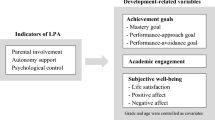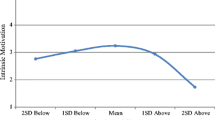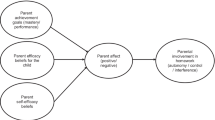Abstract
This study aims to produce a deeper understanding of the relationship between perceived parental homework involvement (i.e., parental homework control and parental homework support), student homework behaviors (i.e., time spend on homework completion, time management, and amount of homework completed), and student academic achievement. Using Mplus5.1, a structural equation model was fit for 1683 students at different stages of schooling (i.e., elementary school − 5th and 6th grades; junior high school − 7th and 8th grades; and high school − 9th and 10th grades). The data showed that student homework behaviors, perceived parental homework involvement, and academic achievement are significantly related. However, results vary depending on the students’ grade level: (a) in junior high and high school, perceived parental homework involvement is related to students’ homework behaviors, but not in elementary school; and (b) although students’ homework behaviors are related to academic achievement at each school level, the direction and magnitude of the relationships vary. Specifically, the relationship between perceived parental homework involvement and academic achievement is stronger in junior high and high school than in elementary school; and student homework behaviors mediate the association between perceived parental homework involvement (control and support) and academic achievement only in junior high and high school.





Similar content being viewed by others
References
Bembenutty, H., & White, M. C. (2013). Academic performance and satisfaction with homework completion among college students. Learning and Individual Differences, 24, 83–88.
Bronson, M. B. (2000). Self-regulation in early childhood: Nature and nurture. New York: Guilford.
Carter, R. S., & Wojtkiewicz, R. A. (2000). Parental involvement with adolescents’ education: do daughters or sons get more help? Adolescence, 35(137), 29–44.
Chen, J. (2008). Grade level differences: relations of parental, teacher and peer support to academic engagement and achievement among Hong Kong students. School Psychology International, 29, 183–198.
Cleary, T. J., & Chen, P. P. (2009). Self-regulation, motivation, and math achievement in middle school: variations across grade level and math context. Journal of School Psychology, 47, 291–314.
Cooper, H. (Ed.). (1989). Homework. New York: Longman.
Cooper, H. (2001). Homework for all—in moderation. Educational Leadership, 58, 34–38.
Cooper, H., & Valentine, J. C. (2001). Using research to answer practical questions about homework. Educational Psychologist, 36, 143–153.
Cooper, H., Lindsey, J., & Nye, B. (2000). Homework in the home: How student, family, and parenting-style differences relate to the homework process. Contemporary Educational Psychology, 25, 464–487.
Cooper, H., Jackson, K., Nye, B., & Lindsay, J. J. (2001). A model of homework’s influence on the performance of elementary school students. Journal of Experimental Education, 69, 181–199.
Cooper, H., Horn, S., & Strahan, D. B. (2005). If only they would do their homework: promoting self-regulation in high school English classes. The High School Journal, 88, 10–25.
Cooper, H., Robinson, J., & Patall, E. (2006). Does homework improve academic achievement? A synthesis of research, 1987–2003. Review of Educational Research, 76, 1–62.
Corno, L. (1994). Student volition and education: Out-comes, influences, and practices. In D. H. Schunk & B. J. Zimmerman (Eds.), Self-regulation of learning and performance: Issues and educational applications (pp. 229–254). Hillsdale: Lawrence Erlbaum Associates, Publishers.
d’Ailly, H. (2003). Children’s autonomy and perceived control in learning: a model of motivation and achievement in Taiwan. Journal of Educational Psychology, 95, 84–96.
de Jong, R., Westerhof, K. J., & Creemers, B. P. M. (2000). Homework and student math achievement in junior high schools. Educational Research and Evaluation, 6, 130–157.
Dearing, E., Kreider, H., Simpkins, S., & Weiss, H. B. (2006). Family involvement in school and low-income children’s literacy: longitudinal association between and within families. Journal of Educational Psychology, 98, 653–664.
Desforges, C., & Abouchaar, A. (2003). The impact of parental involvement, parental support and family education on pupil achievements and adjustments: A literature review. Nottingham: Queen’s Printer.
Dettmers, S., Trautwein, U., & Lüdtke, O. (2009). The relationship between homework time and achievement is not universal: evidence from multilevel analyses in 40 countries. School Effectiveness and School Improvement, 20, 375–405.
Dumont, H., Trautwein, U., Lüdtke, O., Neumann, M., Niggli, A., & Schnyder, I. (2012). Does parental homework involvement mediate the relationship between family background and educational outcomes? Contemporary Educational Psychology, 37, 55–69.
Dumont, H., Trautwein, U., Nagy, G., & Nagengast, B. (2013). Quality of parental homework involvement: predictions and reciprocal relations with academic functioning in the reading domain. Journal of Educational Psychology. doi:10.1037/a0034100.
Epstein, J. L. (1988). Homework practices, achievements, and behaviors of elementary school students. Baltimore, MD: Johns Hopkins University, Center for Research on Elementary and Middle Schools (Report No. 26).
Epstein, J. L. (2005). A case study of the partnership schools comprehensive school reform (CSR) model. The Elementary School Journal, 106, 151–170.
Epstein, J. L., & Lee, S. (1995). National patterns of school and family connections in the middle grades. In B. A. Ryan, G. R. Adams, T. O. Gullota, R. O. Weissberg, & R. L. Hampton (Eds.), The family-school connection: Theory, research, and practice (pp. 108–154). Thousand Oaks: Sage.
Epstein, J. L., & van Voorhis, F. L. (2001). More than minutes: teachers’ roles in designing homework. Educational Psychologist, 36, 181–193.
Epstein, J. L., & van Voorhis, F. L. (2012). The changing debate: From assigning homework to designing homework. In S. Suggate & E. Reese (Eds.), Contemporary debates in child development and education (pp. 263–273). London: Routledge.
Epstein, J. L., Sanders, M. G., & Simon, B. S. (2009). School, family, and community partnerships: Your handbook for action (3rd ed.). Thousand Oaks: Corwin Press.
Fan, X., & Chen, M. (2001). Parental involvement and students’ academic achievement: a meta-analysis. Educational Psychology Review, 13, 1–22.
Farrow, S., Tymms, P., & Hernderson, B. (1999). Homework and attainment in primary schools. British Educational Research Journal, 25, 323–341.
Finney, S. J., & DiStefano, C. (2006). Non-normal and categorical data in structural equation modeling. In G. R. Hancock & R. O. Mueller (Eds.), Structural equation modeling. A second course (pp. 269–314). Greenwich: Information Age Publishing.
Fredricks, J. A., & Eccles, J. S. (2002). Children’s competence and value beliefs from childhood through adolescence. Developmental Psychology, 38, 519–533.
Gonida, E. N., & Cortina, K. S. (2014). Parental involvement in homework: relations with parent and student achievement-related motivational beliefs and achievement. British Journal of Educational Psychology, 84, 376–396.
Grolnick, W. S. (2003). The psychology of parental control: How well-meant parenting backfires. Hillsdale: Lawrence Erlbaum Associates.
Grolnick, W. S., & Slowiaczek, M. L. (1994). Parents’ involvement in children’s schooling: a multidimensional conceptualization and motivational model. Child Development, 65, 237–252.
Grolnick, W. S., Ryan, R. M., & Deci, E. L. (1991). Inner resources for school achievement: motivational mediators of children’s perceptions of their parents. Journal of Educational Psychology, 83, 508–517.
Hill, N. E., & Chao, R. K. (2009). Families, schools, and the adolescent: Connecting research, policy, and practice. New York: Teachers College Press.
Hill, N. E., & Tyson, D. F. (2009). Parental involvement in middle school: a meta-analytic assessment of the strategies that promote achievement. Developmental Psychology, 45(3), 740–763.
Hong, E., & Milgram, R. M. (2000). Homework: Motivation and Learning Preference. Westport: Bergin & Garvey.
Hong, E., Peng, Y., & Rowell, L. L. (2009). Homework self-regulation: grade, gender, and achievement-level differences. Learning and Individual Differences, 19, 269–276.
Hoover-Dempsey, K. V., & Sandler, H. M. (1997). Why do parents become involved in their children’s education? Review of Educational Research, 67, 3–42.
Hoover-Dempsey, K. V., Bassler, O. C., & Burow, R. (1995). Parents’ reported involvement in students’ homework: strategies and practices. The Elementary School Journal, 95, 435–450.
Hoover-Dempsey, K. V., Battiato, A. C., Walker, J. M. T., Reed, R. P., DeJong, J. M., & Jones, K. P. (2001). Parental involvement in homework. Educational Psychologist, 36(3), 195–209.
Hoover-Dempsey, K. V., Walker, J. M. T., Sandler, H. M., Whetsel, D., Green, C. L., Wilkins, A. S., et al. (2005). Why do parents become involved? Research findings and implications. The Elementary School Journal, 106, 105–130.
Hu, L. T., & Bentler, P. M. (1999). Cutoff criteria for fit indexes in covariance structure analysis: conventional criteria versus new alternatives. Structural Equation Modeling, 6, 1–55.
Jacobs, J. E., Lanza, S., Osgood, D. W., Eccles, J. S., & Wigfield, A. (2002). Changes in children’s self-competence and values: gender and domain differences across grades one through twelve. Child Development, 73, 509–527.
Karbach, J., Gottschling, J., Spengler, M., Hegewald, K., & Spinath, F. M. (2013). Parental involvement and general cognitive ability as predictors of domain-specific academic achievement in early adolescence. Learning and Instruction, 23, 43–51.
Levpuscek, M. P., & Zupancic, L. (2009). Math achievement in early adolescence: the role of parental involvement, teacher’s behavior and student’s motivational beliefs about math. Journal of Early Adolescence, 29, 541–570.
Lorenz, F., & Wild, E. (2007). Parental involvement in schooling – results concerning its structure and impact on students’ motivation. In M. Prenzel & L. Allolio-Näcke (Eds.), Studies on the quality of schools (pp. 299–316). Münster: Waxmann.
Lubbers, M. J., van der Werf, M. P. C., Kuyper, H., & Hendriks, A. A. J. (2010). Does homework behavior mediate the relation between personality and academic performance? Learning and Individual Differences, 20, 203–208.
Marsh, H. W., Hau, K. T., & Wen, Z. (2004). In search of golden rules: comment on hypothesis-testing approaches to setting cutoff values for fit indexes and dangers of overgeneralizing Hu and Bentler’s (1999) findings. Structural Equation Modeling, 11, 320–341.
Muthén, L. K., & Muthén, B. O. (1998–2007). Mplus user’s guide. Los Angeles, CA: Authors.
Nadinloyi, K. B., Hajloo, N., Garamaleki, N. S., & Sadeghi, H. (2013). The study efficacy of time management training on increase academic time management of students. Procedia Social and Behavioral Sciences, 84, 134–138.
Nolen-Hoeksema, S., Wolfson, A., Mumme, D., & Guskin, K. (1995). Helpessness in children of depressed and nondepressed mothers. Developmental Psychology, 31, 377–387.
Núñez, J. C., Rosário, P., Vallejo, G., & González-Pienda, J. A. (2013a). A longitudinal assessment of the effectiveness of a school-based mentoring program in middle school. Contemporary Educational Psychology, 38, 11–21.
Núñez, J. C., Suárez, N., Cerezo, R., Rosário, P., & Valle, A. (2013b). Homework and academic achievement across Spanish Compulsory Education. Educational Psychology. doi:10.1080/01443410.2013.817537.
Núñez, J. C., Suárez, N., Rosário, P., Vallejo, G., Cerezo, R., & Valle, A. (2014a). Teachers’ feedback on homework, homework-related behaviors and academic achievement. The Journal of Educational Research. doi:10.1080/00220671.2013.878298.
Núñez, J. C., Vallejo, G., Rosário, P., Tuero, E., & Valle, A. (2014b). Student, teacher, and school context variables predicting academic achievement in Biology: analysis from a multilevel perspective. Revista de Psicodidáctica, 19, 145–171.
Oubrayrie-Roussel, N., & Safont-Mottay, C. (2011). Adolescent homework management strategies and perceptions of parental involvement. International Journal About Parents in Education, 5, 78–85.
Paschal, R. A., Weinstein, T., & Walberg, H. J. (1984). The effects of homework on learning: a quantitative synthesis. The Journal of Educational Research, 78, 97–104.
Patall, E. A., Cooper, H., & Robinson, J. C. (2008). Parent involvement in homework: a research synthesis. Review of Educational Research, 78, 1039–1101.
Pomerantz, E. M., & Eaton, M. M. (2001). Maternal intrusive support in the academic context: transactional socialization processes. Developmental Psychology, 37, 174–186.
Pomerantz, E. M., Grolnick, W. S., & Price, C. E. (2005). The role of parents in how children approach achievement: A dynamic process perspective. In: A. Elliot and C. Dweck (Eds.), Handbook of motivation and competence (pp. 229–278). New York: Guilford.
Pomerantz, E. M., Wang, Q., & Ng, F. F. (2005). The role of children’s competence experiences in the socialization process: a dynamic process framework for the academic arena. In R. Kail (Ed.), Advances in child development and behavior (Vol. 33, pp. 193–227). San Diego: Academic.
Pomerantz, E. M., Moorman, E. A., & Litwack, S. D. (2007). The how, whom and why of parents’ involvement in children’s academic lives: more is not always better. Review of Educational Research, 77, 373–410.
Puustinen, M., Lyra, A. L., Metsapëlto, R. L., & Pulkkinen, L. (2008). Children’s help seeking: the role of parenting. Learning and Instruction, 18, 160–171.
Rosário, P., Mourão, R., Baldaque, M., Nunes, T., Núñez, J. C., González-Pienda, J., Cerezo, R., & Valle, A. (2009). Homework, self-regulated learning and math achievement. Revista de Psicodidáctica, 14, 179–192.
Rosário, P., González-Pienda, J. A., Cerezo, R., Pinto, R., Ferreira, P., Lourenço, A., & Paiva, O. (2010). Efficacy of the program «Testas’s (mis)adventures» to promote the deep approach to learning. Psicothema, 22, 828–834.
Rosário, P., Núñez, J., Valle, A., González-Pienda, J., & Lourenço, A. (2013a). Grade level, study time, and grade retention and their effects on motivation, self-regulated learning strategies, and mathematics achievement: a structural equation model. European Journal of Psychology of Education. doi:10.1007/s10212-012-0167-9.
Rosário, P., Núñez, J. C., Valle, A., Paiva, O., & Polydoro, S. (2013b). Approaches to teaching in High School when considering contextual variables and teacher variables. Revista de Psicodidáctica, 18, 25–45.
Rosário, P., Núñez, J. C., Trigo, L., Guimarães, C., Fernández, E., Cerezo, R.. Fuentes, S., Orellana, M., Santibáñez, A., Fulano, C., Ferreira, A., Figueiredo, M. (2014). Transcultural analysis of the effectiveness of a program to promote self-regulated learning in Mozambique, Chile, Portugal, and Spain. Higher Education Research and Development. doi:10.1080/07294360.2014.935932
Silinskas, G., Lerkkanen, M. K., Tolvanen, A., Niemi, P., Poikkeus, A. M., & Nurmi, J. E. (2012). The frequency of parents' reading-related activities at home and children's reading skills during kindergarten and Grade 1. Journal of Applied Developmental Psychology, 33, 302–310.
Sheldon, S. B., & Epstein, J. L. (2002). Improving student behavior and school discipline with family and community involvement. Education and Urban Society, 35, 4–26.
Skaliotis, E. (2010). Changes in parental involvement in secondary education: an exploration study using the longitudinal study of young people in England. British Educational Research Journal, 36, 975–994.
Skinner, E., Johnson, S., & Snyder, T. (2005). Six dimensions of parenting: a motivational model. Parenting: Science and Practice, 5, 175–235.
Steinberg, L., Elmen, J. D., & Mounts, N. S. (1989). Athoritative parenting, psychosocial maturity, and academic success among adolescents. Child Development, 60, 1424–1436.
Stoeger, H., & Ziegler, A. (2008). Evaluation of a classroom-based training to improve self-regulation in time management tasks during homework activities with fourth graders. Metacognition and Learning, 3, 207–230.
Tam, V. C. (2009). Homework involvement among Hong Kong primary school students. Asian Pacific Journal of Education, 29, 213–227.
Trautwein, U. (2007). The homework-achievement relation reconsidered: Differentiating homework time, homework frequency, and homework effort. Learning and Instruction, 17, 372–388.
Trautwein, U., & Koller, O. (2003). The relationship between homework and achievement—still much of a mystery. Educational Psychology Review, 15, 115–145.
Trautwein, U., & Lüdtke, O. (2009). Predicting homework motivation and homework effort in six school subjects: the role of person and family caracteristics, classroom factors and school track. Learning and Instruction, 19, 243–258.
Trautwein, U., Köller, O., Schmitz, B., & Baumert, J. (2002). Do homework assignments enhance achievement? A multilevel analysis of 7th grade mathematics. Contemporary Educational Psychology, 27, 26–50.
Trautwein, U., Lüdtke, O., Schnyder, I., & Niggli, A. (2006a). Predicting homework effort: support for a domain-specific, multilevel homework model. Journal of Educational Psychology, 98, 438–456.
Trautwein, U., Lüdtke, O., Kastens, C., & Köller, O. (2006b). Effort on homework in grades 5 through 9: development, motivational antecedents, and the association with effort on class-work. Child Development, 77, 1094–1111.
Trautwein, U., Niggli, A., Schnyder, I., & Ludke, O. (2009a). Between-teacher differences in homework assignments and the development of students’ homework effort, homework emotions, and achievement. Journal of Educational Psychology, 101(1), 176–189.
Trautwein, U., Schnyder, I., Niggli, A., Neumann, M., & Lüdtke, O. (2009b). Chameleon effects in homework research: the homework–achievement association depends on the measures used and the level of analysis chosen. Contemporary Educational Psychology, 34, 77–88.
van Voorhis, F. L. (2004). Reflecting on the homework ritual: assignments and designs. Theory Into Practice, 43(3), 205–212.
van Voorhis, F. L. (2011). Costs and benefits of family involvement in homework. Journal of Advanced Academics, 22, 220–249.
Warton, P. M. (2001). The forgotten voices in homework: views of students. Educational Psychologist, 36, 155–165.
Wigfield, A., Eccles, J. S., Yoon, K. S., Harold, R. D., Arbreton, A. J. A., Freedman-Doan, C., & Blumenfeld, P. C. (1997). Change in children’s competence beliefs and subjective task values across the elementary school years: a 3-year study. Journal of Educational Psychology, 89, 451–469.
Xu, J. (2005). Purposes for doing homework reported by middle and high school students. The Journal of Educational Research, 99, 46–55.
Xu, J. (2007). Middle-school homework management: more than just gender and family involvement. Educational Psychology, 27, 173–189.
Xu, J. (2008). Models of secondary school students’ interest in homework: a multilevel analysis. American Educational Research Journal, 45, 1180–1205.
Xu, J. (2010). Predicting homework time management at the secondary school level: a multilevel analysis. Learning and Individual Differences, 20, 34–39.
Xu, J. (2011). Homework completion at the secondary school level: a multilevel analysis. The Journal of Educational Research, 104, 171–182.
Xu, J. (2013). Why Do Students Have Difficulties Completing Homework? The Need for Homework Management. Journal of Education and Training Studies, 1, 98–105. doi:10.11114/jets.v1i1.78
Xu, J., & Corno, L. (2006). Gender, family help, and homework management reported by middle school students. Journal of Research in Rural Education, 21, 1–13.
Xu, J., & Wu, H. (2013). Self-Regulation of homework behavior: homework management at the Secondary School level. The Journal of Educational Research, 106, 1–13.
Xu, J., & Yuan, R. (2003). Doing homework: listening to students’, parents’, and teachers’ voices in one urban middle school community. School Community Journal, 13, 25–44.
Xu, J., Yuan, R., Xu, B., & Xu, M. (2014). Modeling students’ time management in math homework. Learning and Individual Differences, 34, 33–42.
Zimmerman, B. J., & Kitsantas, A. (2005). Homework practices and academic achievement: the mediating role of self-efficacy and perceived responsibility beliefs. Contemporary Educational Psychology, 30, 397–417.
Acknowledgments
This manuscript was completed with the help of funding from Ministry of Science and Innovation (EDU2010-16231 and PSI2011-23395) and the Ministry of Economy and Finance (BES-2011-043927) of Spain.
Author information
Authors and Affiliations
Corresponding author
Appendices
Appendix 1
Appendix Table A
Appendix Table B
Appendix Table C
Rights and permissions
About this article
Cite this article
Núñez, J.C., Suárez, N., Rosário, P. et al. Relationships between perceived parental involvement in homework, student homework behaviors, and academic achievement: differences among elementary, junior high, and high school students. Metacognition Learning 10, 375–406 (2015). https://doi.org/10.1007/s11409-015-9135-5
Received:
Accepted:
Published:
Issue Date:
DOI: https://doi.org/10.1007/s11409-015-9135-5




